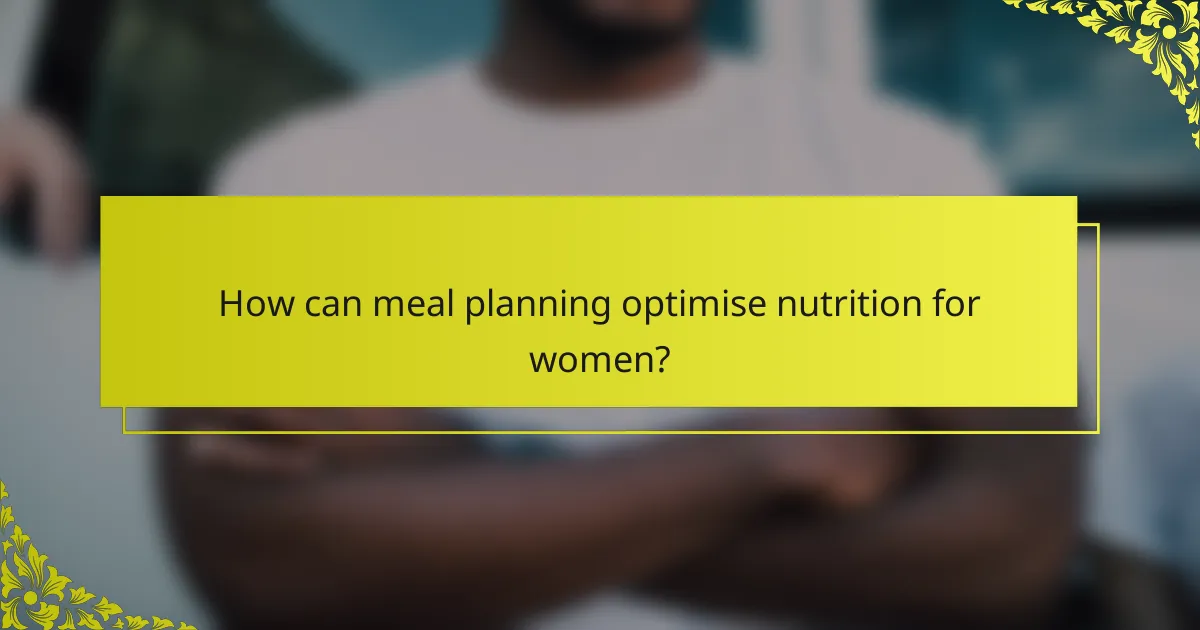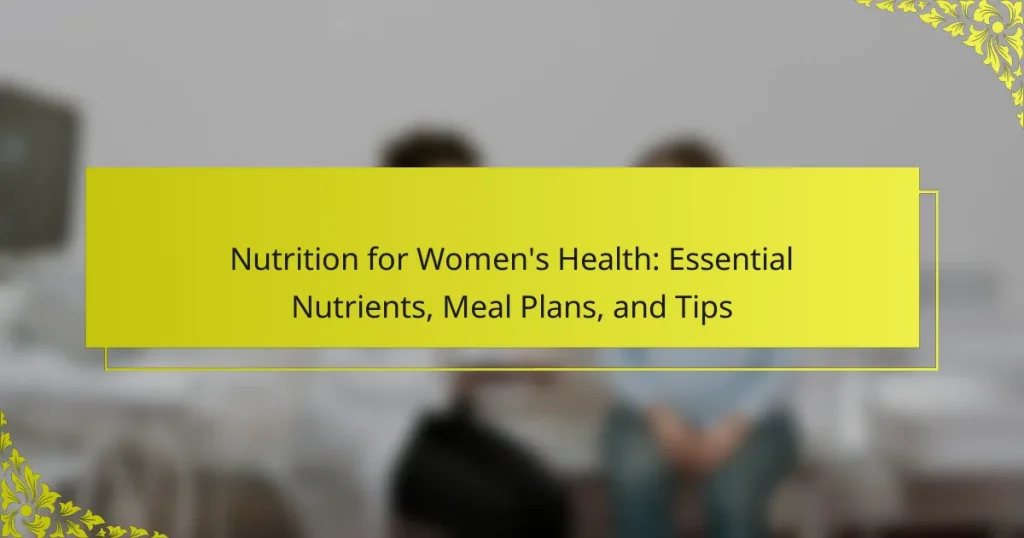Nutrition plays a crucial role in women’s health, impacting energy levels, bone density, and reproductive health. Essential nutrients include iron, calcium, vitamin D, folate, and omega-3 fatty acids. Meal planning can optimise nutrient intake and address common dietary deficiencies. Understanding hydration and debunking nutrition myths are also vital for maintaining a balanced diet.

What are the essential nutrients for women’s health?
Essential nutrients for women’s health include iron, calcium, vitamin D, folate, and omega-3 fatty acids. These nutrients support reproductive health, bone density, and overall wellness.
Iron is crucial for preventing anaemia, especially during menstruation. Women require about 18 mg of iron daily. Calcium and vitamin D work together to enhance bone health, with recommended intakes of 1000 mg and 600 IU respectively. Folate is vital for cell division and is especially important during pregnancy, with a recommended intake of 400 mcg. Omega-3 fatty acids promote heart health and cognitive function, with sources like fatty fish providing substantial amounts.
Incorporating these nutrients into daily meals can enhance women’s health significantly.
How do vitamins and minerals support women’s well-being?
Vitamins and minerals are crucial for women’s well-being, supporting various bodily functions. Essential nutrients like calcium and vitamin D strengthen bones, while iron is vital for energy levels. Folate promotes reproductive health, and antioxidants from vitamins C and E protect against cellular damage. A balanced intake enhances overall health, boosts immunity, and reduces the risk of chronic diseases.
What role does protein play in women’s nutrition?
Protein plays a crucial role in women’s nutrition by supporting muscle health, hormone production, and overall bodily functions. Women require adequate protein intake to maintain lean body mass and promote recovery, especially during pregnancy and lactation. The recommended dietary allowance for protein is about 46 grams per day for women, but needs may vary based on activity level and age. Sources like lean meats, dairy, legumes, and nuts provide essential amino acids necessary for optimal health.
How can healthy fats benefit women’s health?
Healthy fats significantly benefit women’s health by supporting hormonal balance and reducing inflammation. They enhance heart health, promote brain function, and aid in nutrient absorption. For example, omega-3 fatty acids found in fish improve mood and cognitive function, while monounsaturated fats from avocados support cardiovascular health. Including sources of healthy fats in meals can contribute to overall well-being and vitality.

What unique nutritional needs do women have at different life stages?
Women have unique nutritional needs throughout different life stages, influenced by hormonal changes, reproductive health, and lifestyle.
During adolescence, increased iron and calcium intake supports growth and development. In reproductive years, women require more folate and iron to support menstruation and pregnancy. Post-menopause, calcium and vitamin D become critical for bone health, while protein intake helps maintain muscle mass.
These adjustments ensure optimal health and well-being, addressing the specific requirements at each stage.
How does nutrition change during pregnancy?
Nutrition significantly changes during pregnancy to support fetal development. Key adjustments include increased intake of essential nutrients like folic acid, iron, and calcium.
Folic acid is crucial for preventing neural tube defects, while iron supports increased blood volume. Calcium is vital for developing the baby’s bones and teeth. Pregnant women should focus on a balanced diet rich in fruits, vegetables, whole grains, and lean proteins.
Meal plans should consider smaller, more frequent meals to manage nausea and promote energy levels. Staying hydrated is also important, as fluid needs increase during pregnancy.
Monitoring weight gain is essential, as it varies based on pre-pregnancy weight and health. Consulting a healthcare provider can help tailor individual nutritional needs.
What are the dietary considerations for women in menopause?
Women in menopause should focus on a balanced diet rich in calcium, vitamin D, and phytoestrogens. These nutrients help manage symptoms and support bone health.
Calcium is essential for bone density, with recommended intake at 1,200 mg daily. Vitamin D aids calcium absorption; aim for 600 IU per day. Phytoestrogens, found in soy products and flaxseeds, can alleviate hot flashes.
Incorporating whole grains, fruits, and vegetables provides fibre and antioxidants, promoting overall health. Hydration is crucial; drink plenty of water to manage dryness and support metabolism.
Regular meal planning ensures nutrient intake aligns with health goals during menopause, enhancing well-being.

What are the common dietary deficiencies among women?
Common dietary deficiencies among women include iron, calcium, vitamin D, folate, and magnesium. These nutrients are crucial for women’s health, impacting energy levels, bone density, and reproductive health.
Iron deficiency is prevalent, particularly among menstruating women, leading to fatigue and weakness. Calcium and vitamin D are essential for bone health, with many women not meeting the recommended intake. Folate is vital during pregnancy for fetal development, yet many women lack sufficient levels. Magnesium plays a role in various bodily functions, and deficiencies can lead to muscle cramps and mood changes.
Addressing these deficiencies through a balanced diet or supplements can significantly improve overall health and well-being.
How can iron deficiency impact women’s health?
Iron deficiency can significantly impact women’s health by leading to fatigue, weakened immunity, and complications during pregnancy. Women are at higher risk due to menstruation, pregnancy, and dietary choices. For instance, a study indicates that approximately 20% of women of reproductive age are iron deficient. Symptoms may include dizziness, shortness of breath, and pale skin. Addressing iron deficiency through diet or supplements is essential for maintaining overall health and well-being.
What are the effects of calcium deficiency in women?
Calcium deficiency in women can lead to severe health issues, including weakened bones, increased risk of osteoporosis, and heightened susceptibility to fractures. Women are particularly vulnerable due to hormonal changes, especially during menopause. Calcium plays a crucial role in maintaining bone density and overall health. As a result, inadequate intake can lead to long-term complications, such as cardiovascular problems and muscle cramps. Regular monitoring and sufficient dietary intake of calcium-rich foods are essential to mitigate these risks.

How can meal planning optimise nutrition for women?
Meal planning optimises nutrition for women by ensuring balanced intake of essential nutrients. It supports weight management, enhances energy levels, and reduces the risk of chronic diseases. A well-structured meal plan incorporates macronutrients like proteins, healthy fats, and carbohydrates tailored to women’s unique dietary needs. For instance, including iron-rich foods can combat anaemia, while calcium and vitamin D support bone health. Regular meal planning can also encourage mindful eating, helping women make healthier food choices and improve overall well-being.
What are some effective meal prep strategies for busy women?
Effective meal prep strategies for busy women include planning meals in advance, batch cooking, and utilising versatile ingredients. Prioritise nutrient-dense foods like vegetables, lean proteins, and whole grains.
Consider dedicating one day a week to meal prep. Prepare larger quantities of staples such as quinoa or brown rice, and store them in portioned containers. Incorporate a variety of flavours using herbs and spices to keep meals exciting.
Invest in quality containers that are microwave and dishwasher safe. This will streamline the reheating process and ensure easy cleanup.
Lastly, keep a well-stocked pantry with essentials like canned beans, frozen vegetables, and healthy snacks. This will minimise the temptation to order takeout when time is tight.
How can women create balanced meal plans?
Women can create balanced meal plans by incorporating a variety of nutrient-dense foods. Focus on whole grains, lean proteins, healthy fats, fruits, and vegetables. Aim for a balance of macronutrients: carbohydrates, proteins, and fats.
Consider portion sizes to manage caloric intake and ensure meals are satisfying. Meal prepping can help maintain consistency and reduce reliance on convenience foods.
Stay hydrated and include snacks that provide energy without excess sugar. Regularly reassess dietary choices to align with health goals.
What should a weekly meal plan look like?
A weekly meal plan for women’s health should include a variety of nutrient-dense foods. Focus on incorporating fruits, vegetables, whole grains, lean proteins, and healthy fats.
1. **Breakfast**: Oatmeal topped with berries and nuts.
2. **Lunch**: Quinoa salad with mixed greens, chickpeas, and avocado.
3. **Dinner**: Grilled salmon with steamed broccoli and sweet potatoes.
4. **Snacks**: Greek yogurt with honey, or carrot sticks with hummus.
This balanced approach ensures essential nutrients are consumed while promoting overall well-being. Aim for hydration with water throughout the day.

What are the best food sources for essential nutrients?
Leafy greens, nuts, seeds, whole grains, lean proteins, and dairy products are the best food sources for essential nutrients. These foods provide vitamins, minerals, healthy fats, and proteins crucial for women’s health. For example, leafy greens like spinach are high in iron and calcium, while nuts offer healthy fats and vitamin E. Whole grains supply fibre and B vitamins, supporting digestion and energy levels. Lean proteins, such as chicken and fish, provide essential amino acids for muscle health. Dairy products are rich in calcium and vitamin D, vital for bone strength. Incorporating a variety of these foods ensures a balanced intake of essential nutrients.
Which fruits and vegetables are particularly beneficial for women?
Fruits and vegetables that particularly benefit women include leafy greens, berries, avocados, and sweet potatoes. Leafy greens like spinach provide iron and calcium, essential for women’s health. Berries are rich in antioxidants, promoting heart health. Avocados offer healthy fats and fibre, supporting hormonal balance. Sweet potatoes are high in beta-carotene, beneficial for skin health.
What whole grains should women include in their diets?
Women should include oats, quinoa, brown rice, barley, whole wheat, and bulgur in their diets. These whole grains provide essential nutrients, fibre, and antioxidants that support overall health. Oats are particularly high in beta-glucan, which can help lower cholesterol. Quinoa is a complete protein, offering all nine essential amino acids. Brown rice is rich in magnesium, supporting bone health. Barley contains beta-glucans that enhance heart health. Whole wheat is a good source of B vitamins, crucial for energy metabolism. Bulgur is high in fibre, promoting digestive health.

How does hydration impact women’s health?
Hydration significantly impacts women’s health by supporting bodily functions and preventing dehydration. Proper hydration aids in digestion, nutrient absorption, and temperature regulation. Women generally require about 2.7 litres of total water intake daily, including beverages and food. Insufficient hydration can lead to fatigue, headaches, and decreased cognitive function, particularly during menstruation or pregnancy. Staying well-hydrated can enhance skin health and overall vitality, emphasising the importance of water in a balanced nutrition plan.
What are the signs of dehydration in women?
Signs of dehydration in women include dry mouth, fatigue, dizziness, and dark yellow urine. Other symptoms may be headaches, rapid heartbeat, and decreased urine output. Recognising these signs early is crucial for maintaining optimal hydration and overall health. Women may experience unique dehydration symptoms due to hormonal changes, especially during menstruation or pregnancy. Staying hydrated supports bodily functions and enhances energy levels.

What are the common misconceptions about women’s nutrition?
Many misconceptions surround women’s nutrition, often leading to inadequate dietary choices. One common myth is that women need significantly fewer calories than men, which overlooks individual activity levels and metabolic rates. Another misconception is that all carbohydrates are unhealthy, ignoring the benefits of whole grains and fruits. Additionally, the belief that women should avoid fats entirely is misleading, as healthy fats are crucial for hormone balance. Lastly, some think that supplements can replace a balanced diet, which is not true; whole foods provide essential nutrients that supplements cannot fully replicate.
How can women navigate dietary myths?
Women can navigate dietary myths by seeking evidence-based information and consulting healthcare professionals. Understanding the differences between facts and myths is essential for making informed nutritional choices.
Common myths include misconceptions about carbohydrates and fats. For instance, healthy fats are vital for hormone balance and overall health. Emphasising whole foods, such as fruits, vegetables, and lean proteins, supports optimal nutrition.
Education is crucial; women should leverage resources from reputable organisations like the Academy of Nutrition and Dietetics. Engaging with community support groups can also provide valuable insights and encouragement.
Lastly, staying updated on current research helps debunk myths and promotes a balanced approach to nutrition.

What are the best practices for maintaining a healthy diet?
To maintain a healthy diet, focus on balanced meals rich in essential nutrients. Prioritise whole foods, including fruits, vegetables, whole grains, lean proteins, and healthy fats. Incorporate a variety of food groups to ensure adequate intake of vitamins and minerals. Meal planning can help manage portion sizes and reduce unhealthy choices. Aim for regular hydration and limit processed foods high in sugar and sodium.
What are some common mistakes women make in their diets?
Common mistakes women make in their diets include skipping meals, focusing excessively on low-calorie options, and neglecting essential nutrients. These errors can lead to nutritional deficiencies and hinder overall health.
Many women underestimate the importance of protein, which aids in muscle maintenance and satiety. Additionally, not consuming enough healthy fats can impact hormone balance and energy levels.
Another frequent mistake is relying on fad diets that promise quick results but are unsustainable. These diets often lack necessary vitamins and minerals, ultimately affecting long-term health.
Finally, emotional eating can lead to poor food choices. Recognising triggers for emotional eating can help women make healthier decisions.
How can women optimise their nutrition for better health outcomes?
Women can optimise their nutrition by focusing on essential nutrients, balanced meal plans, and practical tips. Key nutrients include iron, calcium, and folate, which support reproductive health and bone density. Incorporating a variety of fruits, vegetables, whole grains, and lean proteins enhances nutrient intake.
Meal planning should prioritise nutrient-dense foods while considering individual dietary needs. For instance, a weekly meal plan can include leafy greens for iron, dairy or fortified plant-based alternatives for calcium, and legumes for folate.
Additionally, staying hydrated and practising mindful eating can improve digestion and overall health. Regularly assessing portion sizes and listening to hunger cues plays a crucial role in maintaining a healthy weight.
Finally, consulting with a healthcare provider or nutritionist can tailor dietary choices to personal health conditions, ensuring optimal nutrition for better health outcomes.




